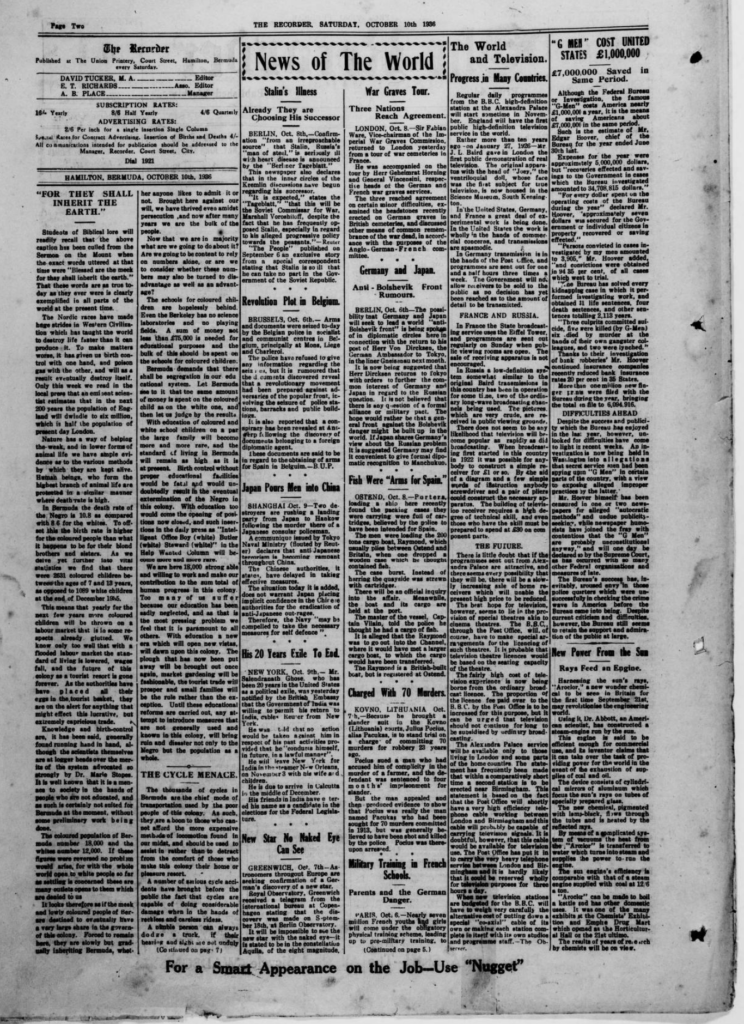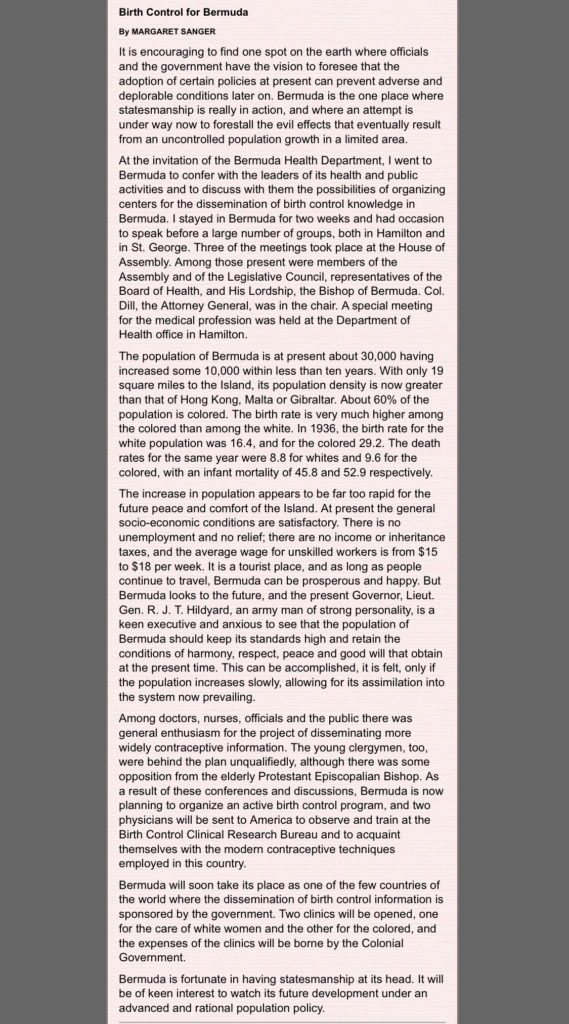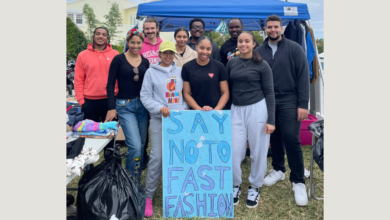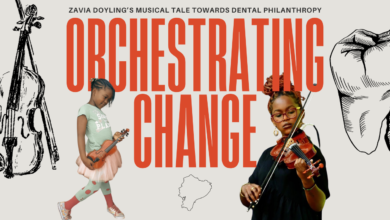In 1936, The Governor of Bermuda, Sir Reginald Hildyard planned to implement birth control to stop the growing population of Black families on the island. In a New York Times article, the Governor said the purpose was for socio-economic balance. This balance was based off the decision that an increased Black population will lead to “lower wages and poorer standards of living”.
Black people were not given higher education or liveable wages like White people. The Governor – along with government – did not plan to give Black people equal opportunity, like better paying jobs. Therefore, more Black people would increase poverty, and an increase in poverty would impact tourism – according to the Government.
You may not have learnt about this in school.
(explicit language in graphics/sources)
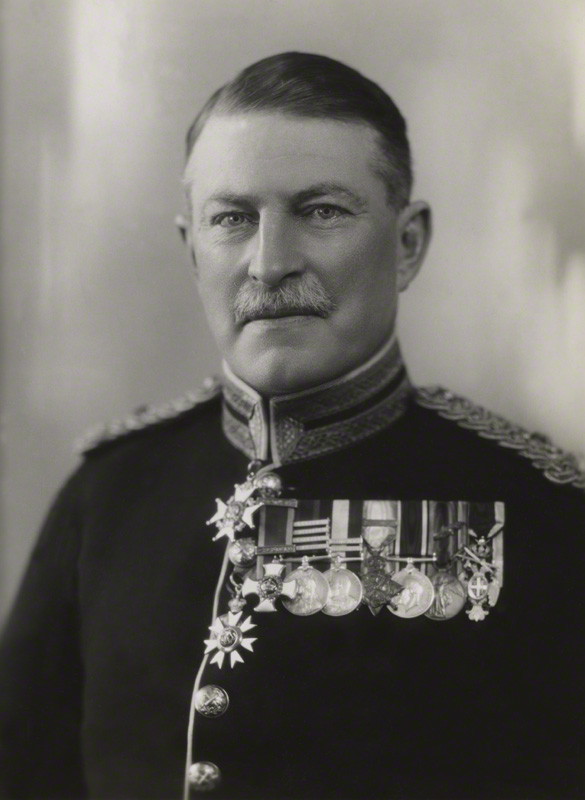
Governor General Sir Reginald Hildyard, (Gov. 1936-1939)
by Bassano, vintage print, 4 March 1930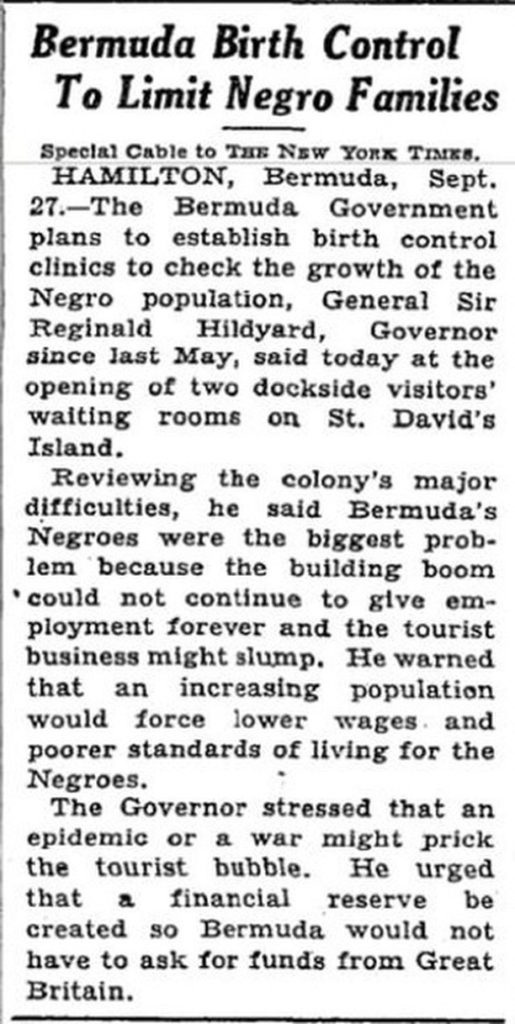
New York Times. article, published September 27, 1936
On October 10, 1936, The Bermuda Recorder printed an article in their issue titled: For they shall inherit the Earth. The article was about the poor wages from labour and the lack of higher education for Black Bermudians. In response to the Governor’s tourism remarks, The Recorder mentioned the lack of socio-economic structure, alerting that “authorities have placed all their eggs in the tourist basket” – once again.
As Recorder columnist “Vigilant” similarly argued: “if one half of the energy spent in fulminating Birth control plans for the Negro was diverted into channels calculated to afford equal chances of social and economic development of this same group there would be less need for talk of Birth-control.”
BOURBONNAIS, NICOLE. BIRTH CONTROL AND REPRODUCTIVE POLITICS IN THE WEST INDIED, 1930-1970
In 1936, there were about 18,000 Black Bermudians and 12,000 White Bermudians. The writer in The Recorder said if the ratio was switched – there would be no discussion on birth control. They asked their readers, “now that we (Black Bermudians) are the majority, what are we going to do about it?” they questioned a change in governance.
In July of 1936, Margaret Sanger – a birth control activist and lead organiser in the US Planned Parenthood visited Bermuda to write an article about the Governor’s decision for birth control. Sanger’s key points were:
- The government planned to open two clinics (one for White Bermudians and one for Black Bermudians)
- Birth rates in the Black community were much higher than the White community, yet death rates were higher in the Black community opposed to the White community
- Sanger also praised the Governor for being progressive, because she believed if the population can be controlled – tourism would thrive
In 2021, the Tourism Industry in Bermuda remains one of the top topics when debating the economic future of how Bermuda will gain revenue – even during a pandemic. Tourism in Bermuda has been discussed, dissected and debated, more than the impacts of enslavement and segregation in Bermuda.
In a 372 page dissertation by Nicole Bourbonnais (defended on April 3, 2013) titled: OUT OF THE BOUDOIR AND INTO THE BANANA WALK: BIRTH CONTROL AND REPRODUCTIVE POLITICS IN THE WEST INDIES, 1930-1970, Bermuda was highlighted as the first Caribbean country to start birth control. The dissertation included time lines of government hearings on decisions and readings of how, if and when birth control would be brought to Bermuda.
The community was split and the talk about eugenics spread globally, where Black people from other countries were writing and marching to defend the Black people of Bermuda – and in connection, the other Caribbean countries: Barbados, Bahamas, etc.
When new measures are implemented in one country, other countries tend to follow the same practices. Protestors knew if birth control was accepted in Bermuda under the goal to reduce the number of Black people, other countries will use Bermuda as an example to force the same narrative.
Invasive and graphic were the discussions in the House.
“They – nine members of a Select Committee of the House – also called for the compulsory sterilization of mental defectives, women who mothered two illegitimate children and men who fathered one illegitimate child, as well as the castration of persons found guilty of rape, attempted rape or “other sexual and/or unnatural offences.”
bourbonnais, nicole. Birth control and reproductive politics in the west indied, 1930-1970
Margaret E. Misick, a member of the Woman Suffrage Society expressed that birth control should be a choice. She also exclaimed that men shouldn’t have deciding power over what should be done to a woman’s body. And lastly, she said the issue isn’t Bermuda’s growing population – it’s greed.
“I think that is getting away from the real issue. No country can call this problem a problem of over-population. It is, and I think we should not cease to emphasise [sic] it, an economic problem of unemployment, and we should deal with it as such.
Maybe we will have to face the question of unemployment relief. I think that is what the Legislature is afraid of; they are afraid they might have to put their hands in their pockets and pay some persons during unemployment which is unavoidable on their part.”
This argument was echoed by suffragist Margaret E. Misick, who felt that birth control should not be seen as “a panacea for all economic ills”-.
BOURBONNAIS, NICOLE. BIRTH CONTROL AND REPRODUCTIVE POLITICS IN THE WEST INDIED, 1930-1970
Were all Black Bermudians against birth control? No.
There were women who would have freely taken the option to do so because yes, birth rates in Black families were higher. Many struggled because they were unable to provide for their families due to forced poor wages and the enforcement of poverty on the Black community.
The dissertation ‘Birth Control and Reproductive Politics in the West Indies, 1930 – 1970’ states that prior to the Governor’s reason to implement birth control, journalists from The Recorder and influential labour activists like Edgar Fitzgerald Gordon were pro choice when it came to birth control.
“However, Tucker and other Recorder journalists made it clear that in order to be empowering rather than oppressive, birth control services needed to be completely voluntary, apply to “every section of our island community” and not merely “one group,” and be accompanied by education, employment opportunities, and other measures to address wider economic inequalities.” Quoted from the dissertation, page 57.
The issue was never the use of birth control. The issue was the Governor directly forcing birth control on Black People.

Does the history of birth control effect recent events?
In later years, birth control became a choice, but Planned Parenthood still practiced the push for ‘Blacks only’ for birth control.
Eugene Stovell is 72-years-old. He was a former member of the Bermuda Industrial Union (BIU) and former illustrator for the Workers Voice. Stovell recalls stories of women being sterilised unknowingly by their doctors in the early 1950s and uncovering a portion of the Government’s purpose for planned parenthood in the late 1970s: to encourage Black women to choose birth control – and stop White women from using birth control.
In the early 1970s in Bermuda, Stovell spoke with the late Doreen Lightbourne, former editor of the Workers Voice. They conducted a small experiment to uncover a focus behind Planned Parenthood.
According to Mr. Stovell, Doreen asked two of her White English friends to go to the Health Clinics and inquire about starting birth control – as White women.
“The first woman went there and she was told by another White nurse that ‘this plan is not for you, you don’t need to embark about this here, this is not for you. We’re trying to control a segment of the community that’s just popping babies out all over the place'”, said Mr. Stovell. The segment of the population she was referring to was the Black population.
(watch video for full story)
Mr. Stovell said that a month later, the other white friend went into the clinic to inquire about birth control and was told the same thing. Although birth control was a choice, some White women were told not to take it by their nurses. This was in the early 1970’s.
What other event may have happened because of this moment in history? Choices have a ripple effect. Some practices don’t change – they are simply renamed.
Sources:
I’d like to thank Citizens Uprooting Racism in Bermuda (CURB) for their original research which was sent to me. I’d like to thank Mr. Eugene Stovell for taking the time to share his stories with me. He is currently doing research on a timeline of Bermuda’s socio-economic statuses: who has the power now? And how did it start?
- CURB
- Eugene Stovell
- dissertation: BOURBONNAIS, NICOLE. BIRTH CONTROL AND REPRODUCTIVE POLITICS IN THE WEST INDIED, 1930-1970
- Newspaper: The Recorder
- Newspaper: New York Times
- Margaret Sanger Articles



